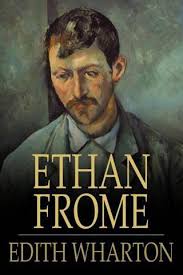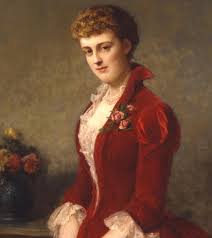Ethan Frome Page #5
Ethan Frome is a 1911 book by American author Edith Wharton. It is set in the fictitious town of Starkfield, Massachusetts. The novel was adapted into a film, Ethan Frome, in 1993.
The young man, skirting the side of the building, went down the slope toward the basement door. To keep out of range of the revealing rays from within he made a circuit through the untrodden snow and gradually approached the farther angle of the basement wall. Thence, still hugging the shadow, he edged his way cautiously forward to the nearest window, holding back his straight spare body and craning his neck till he got a glimpse of the room. Seen thus, from the pure and frosty darkness in which he stood, it seemed to be seething in a mist of heat. The metal reflectors of the gas-jets sent crude waves of light against the whitewashed walls, and the iron flanks of the stove at the end of the hall looked as though they were heaving with volcanic fires. The floor was thronged with girls and young men. Down the side wall facing the window stood a row of kitchen chairs from which the older women had just risen. By this time the music had stopped, and the musicians--a fiddler, and the young lady who played the harmonium on Sundays--were hastily refreshing themselves at one corner of the supper-table which aligned its devastated pie-dishes and ice-cream saucers on the platform at the end of the hall. The guests were preparing to leave, and the tide had already set toward the passage where coats and wraps were hung, when a young man with a sprightly foot and a shock of black hair shot into the middle of the floor and clapped his hands. The signal took instant effect. The musicians hurried to their instruments, the dancers--some already half-muffled for departure--fell into line down each side of the room, the older spectators slipped back to their chairs, and the lively young man, after diving about here and there in the throng, drew forth a girl who had already wound a cherry-coloured “fascinator” about her head, and, leading her up to the end of the floor, whirled her down its length to the bounding tune of a Virginia reel. Frome's heart was beating fast. He had been straining for a glimpse of the dark head under the cherry-coloured scarf and it vexed him that another eye should have been quicker than his. The leader of the reel, who looked as if he had Irish blood in his veins, danced well, and his partner caught his fire. As she passed down the line, her light figure swinging from hand to hand in circles of increasing swiftness, the scarf flew off her head and stood out behind her shoulders, and Frome, at each turn, caught sight of her laughing panting lips, the cloud of dark hair about her forehead, and the dark eyes which seemed the only fixed points in a maze of flying lines. The dancers were going faster and faster, and the musicians, to keep up with them, belaboured their instruments like jockeys lashing their mounts on the home-stretch; yet it seemed to the young man at the window that the reel would never end. Now and then he turned his eyes from the girl's face to that of her partner, which, in the exhilaration of the dance, had taken on a look of almost impudent ownership. Denis Eady was the son of Michael Eady, the ambitious Irish grocer, whose suppleness and effrontery had given Starkfield its first notion of “smart” business methods, and whose new brick store testified to the success of the attempt. His son seemed likely to follow in his steps, and was meanwhile applying the same arts to the conquest of the Starkfield maidenhood. Hitherto Ethan Frome had been content to think him a mean fellow; but now he positively invited a horse-whipping. It was strange that the girl did not seem aware of it: that she could lift her rapt face to her dancer's, and drop her hands into his, without appearing to feel the offence of his look and touch. Frome was in the habit of walking into Starkfield to fetch home his wife's cousin, Mattie Silver, on the rare evenings when some chance of amusement drew her to the village. It was his wife who had suggested, when the girl came to live with them, that such opportunities should be put in her way. Mattie Silver came from Stamford, and when she entered the Fromes' household to act as her cousin Zeena's aid it was thought best, as she came without pay, not to let her feel too sharp a contrast between the life she had left and the isolation of a Starkfield farm. But for this--as Frome sardonically reflected--it would hardly have occurred to Zeena to take any thought for the girl's amusement. When his wife first proposed that they should give Mattie an occasional evening out he had inwardly demurred at having to do the extra two miles to the village and back after his hard day on the farm; but not long afterward he had reached the point of wishing that Starkfield might give all its nights to revelry. Mattie Silver had lived under his roof for a year, and from early morning till they met at supper he had frequent chances of seeing her; but no moments in her company were comparable to those when, her arm in his, and her light step flying to keep time with his long stride, they walked back through the night to the farm. He had taken to the girl from the first day, when he had driven over to the Flats to meet her, and she had smiled and waved to him from the train, crying out, “You must be Ethan!” as she jumped down with her bundles, while he reflected, looking over her slight person: “She don't look much on housework, but she ain't a fretter, anyhow.” But it was not only that the coming to his house of a bit of hopeful young life was like the lighting of a fire on a cold hearth. The girl was more than the bright serviceable creature he had thought her. She had an eye to see and an ear to hear: he could show her things and tell her things, and taste the bliss of feeling that all he imparted left long reverberations and echoes he could wake at will. It was during their night walks back to the farm that he felt most intensely the sweetness of this communion. He had always been more sensitive than the people about him to the appeal of natural beauty. His unfinished studies had given form to this sensibility and even in his unhappiest moments field and sky spoke to him with a deep and powerful persuasion. But hitherto the emotion had remained in him as a silent ache, veiling with sadness the beauty that evoked it. He did not even know whether any one else in the world felt as he did, or whether he was the sole victim of this mournful privilege. Then he learned that one other spirit had trembled with the same touch of wonder: that at his side, living under his roof and eating his bread, was a creature to whom he could say: “That's Orion down yonder; the big fellow to the right is Aldebaran, and the bunch of little ones--like bees swarming--they're the Pleiades...” or whom he could hold entranced before a ledge of granite thrusting up through the fern while he unrolled the huge panorama of the ice age, and the long dim stretches of succeeding time. The fact that admiration for his learning mingled with Mattie's wonder at what he taught was not the least part of his pleasure. And there were other sensations, less definable but more exquisite, which drew them together with a shock of silent joy: the cold red of sunset behind winter hills, the flight of cloud-flocks over slopes of golden stubble, or the intensely blue shadows of hemlocks on sunlit snow. When she said to him once: “It looks just as if it was painted!” it seemed to Ethan that the art of definition could go no farther, and that words had at last been found to utter his secret soul....
Translation
Translate and read this book in other languages:
Select another language:
- - Select -
- 简体中文 (Chinese - Simplified)
- 繁體中文 (Chinese - Traditional)
- Español (Spanish)
- Esperanto (Esperanto)
- 日本語 (Japanese)
- Português (Portuguese)
- Deutsch (German)
- العربية (Arabic)
- Français (French)
- Русский (Russian)
- ಕನ್ನಡ (Kannada)
- 한국어 (Korean)
- עברית (Hebrew)
- Gaeilge (Irish)
- Українська (Ukrainian)
- اردو (Urdu)
- Magyar (Hungarian)
- मानक हिन्दी (Hindi)
- Indonesia (Indonesian)
- Italiano (Italian)
- தமிழ் (Tamil)
- Türkçe (Turkish)
- తెలుగు (Telugu)
- ภาษาไทย (Thai)
- Tiếng Việt (Vietnamese)
- Čeština (Czech)
- Polski (Polish)
- Bahasa Indonesia (Indonesian)
- Românește (Romanian)
- Nederlands (Dutch)
- Ελληνικά (Greek)
- Latinum (Latin)
- Svenska (Swedish)
- Dansk (Danish)
- Suomi (Finnish)
- فارسی (Persian)
- ייִדיש (Yiddish)
- հայերեն (Armenian)
- Norsk (Norwegian)
- English (English)
Citation
Use the citation below to add this book to your bibliography:
Style:MLAChicagoAPA
"Ethan Frome Books." Literature.com. STANDS4 LLC, 2025. Web. 23 Feb. 2025. <https://www.literature.com/book/ethan_frome_264>.








Discuss this Ethan Frome book with the community:
Report Comment
We're doing our best to make sure our content is useful, accurate and safe.
If by any chance you spot an inappropriate comment while navigating through our website please use this form to let us know, and we'll take care of it shortly.
Attachment
You need to be logged in to favorite.
Log In